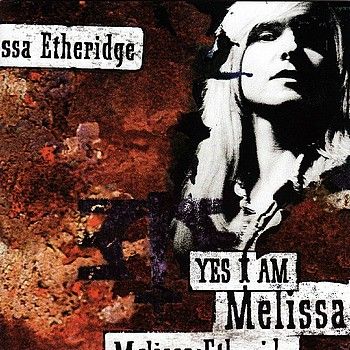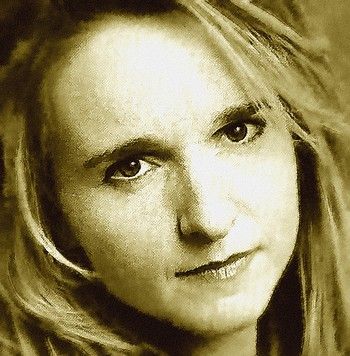
Melissa Etheridge - Yes I Am - 1993 - Island
Melissa Etheridge wasn't out of the closet when she released Yes I Am in 1993, yet it's hard not to notice the defiant acclamation in the album's title. This barely concealed sense of sexual identity seeps out from the lyrics, and it informs the music as well, which is perhaps the most confident she has ever been. It's also the most professional she's ever been (perhaps not a coincidence), as she belts out these unapologetically anthemic numbers with a sense of finesse that's suited to lifestyle newspaper pages, not rock & roll, thereby setting herself up for her bout with celebrity during the second half of the '90s. Yes I Am wouldn't have been as convincing if it wasn't so slick, though; her Springsteen-isms and Janis tributes are tempered by songs that work as album rock favorites, even if they aren't as epic or passionate as their inspirations. She may not have songs as great as she did the first time out — "Somebody Bring Me Some Water" remains her finest moment — but she has a sense of purpose and identity that suits her well. And that identity wound up being the touchstone for the rest of her career. © Stephen Thomas Erlewine, allmusic.com
On "Yes I Am", Melissa Etheridge looks at some personal and controversial themes. "Silent Legacy" is about a man who told her about throwing his daughter out his home when he discovered her having sex. "All American Girl" is about AIDS, and abortion. These may not be subjects normally associated with a best selling album. The album sold six million units in the U.S. in one year, and won a 1995 Grammy Award for Best Female Rock Vocalist. Mellisa made an interesting comment on this album when she said, - "I think its a wider range of writing for me. I think it's the best sounding album I've made, working with Hugh Padgham. Other than that I think it's just right on track." "I look for the reality in relationships," she says. "The reality is it's going to be up and down. If you want it to work, you have to work at it. It's not going to be all roses and fun. There's going to be some downtime, and I write that. I write about those conflicts." Melissa's gravelly voice, like a cross between Maggie Bell and Bonnie Tyler, is wonderful, and "Yes I Am" is a terrific album from one of rock's most intelligent and talented artists. For many years now she has combined some of today's important social and political topics with great melodies and superior musicianship. Melissa's "Lucky" album is another of her great albums. Try and listen to it sometime
ALBUM NOTE [ WIKIPEDIA]
Yes I Am is the fourth album by singer/songwriter Melissa Etheridge, released in 1993 (see 1993 in music). The title is generally thought to refer to Etheridge's recent coming out as a lesbian, confirming long-standing rumours about her personal life. This is the album that gave Melissa Etheridge national recognition. The rock ballad "Come to My Window" was the first video from the album, with Etheridge and her guitar and actress Juliette Lewis having a nervous breakdown. This single brought the album into the public consciousness and was quickly followed by "I'm the Only One" (a U.S. #8 hit) and "If I Wanted To" (U.S. #16).
TRACKS
1 I'm the Only One
2 If I Wanted To
3 Come to My Window
4 Silent Legacy
5 I Will Never Be the Same
6 All American Girl
7 Yes I Am
8 Resist
9 Ruins
10 Talking to My Angel
All songs composed by Melissa Etheridge
MUSICIANS
Melissa Etheridge - Guitar (Acoustic), Guitar, Guitar (Electric), Vocals
Waddy Wachtel, Richard Wachtel - Guitar (Electric)
David Sutton, Pino Palladino, Kevin McCormick - Bass
Scott Thurston - Bass, Keyboards
Mauricio-Fritz Lewak - Percussion, Drums
James Fearnley - Accordion
REVIEWS
Yes I Am is the album that catapulted Melissa Etheridge into superstardom. The 1993 collection's mercilessly driven, bluesy songs--nearly all dripping with sensual lyrics and rousing rhythms--made it the ideal breeding ground for a couple of career-enhancing music videos. The eerily possessive rock ballad "Come to My Window" hit the tube first with a bizarre twofold portrait of Etheridge and her guitar and actress Juliette Lewis having a nervous breakdown. This single brought the album into the public consciousness and was quickly followed by the similarly obsessive, slow-groovin' "I'm the Only One" and the co-dependence-battling "If I Wanted To." But the album's real strength is in the hidden gems untouched by MTV programmers. The slow-building "Silent Legacy," the undulating blues scream "Yes I Am," and the playful, acoustic "Ruins" are what make this album a whole. © Sally Weinbach, © 1996-2009, Amazon.com, Inc. or its affiliates
On her fourth album, Melissa Etheridge continues to write songs with a strong rock base and no sign of giving in to any kinds of trends. With the one-two punch of "I'm The Only One" and "Come To My Window," Etheridge manages to break through to bigger success on her own terms. YES I AM continues with tales of love within the lives of ordinary people while still managing to touch on a few different themes. "All American Girl" mentions AIDS, while "Talking To My Angel" is about growing up alienated in a small town. An added bonus is the inclusion of "I Will Never Be The Same," a previously unreleased track which was one of a few Etheridge songs featured in the movie WELCOME HOME ROXIE CARMICHAEL.Entertainment Weekly (9/24/93, p.93) - "...[Etheridge's] music has an intimacy not often found in the boys' club of mainstream rock. There's also a darkness that's very appealing, as Etheridge hurls her haunted rasp of a voice through songs of desperate love..." - Rating: B, © 1996 - 2009 CD Universe; Portions copyright 1948 - 2009 Muze Inc.
For personal non-commercial use only. All rights reserved.

BIO
Melissa Etheridge became one of the most popular recording artists of the '90s due to her mixture of confessional lyrics, pop-based folk-rock, and raspy, Janis Joplin/Rod Stewart-esque vocals. But the road to stardom was not all smooth sailing for Etheridge as she debated behind the scenes whether or not to disclose to the public that she was gay early on in her career. Born May 29, 1961, in Leavenworth, KS, Etheridge first picked up the guitar at the age of eight and began penning her own songs shortly thereafter. Playing in local bands throughout her teens, Etheridge then attended the renowned Berklee College of Music in Boston, MA. The up-and-coming singer/songwriter and guitarist dropped out after a year before making her way to Los Angeles in the early '80s to give a shot at a career in music. Etheridge's music at this point was slightly more bluesy than her subsequently renowned folk-pop style, as a demo of original compositions caught the attention of Bill Leopold, who signed on as Etheridge's manager. Soon after, steady gigs began coming her way, including a five-night-a-week residency at the Executive Suite in Long Beach, which led to a bidding war between such major record labels as A&M, Capitol, EMI, and Warner Bros., but it was Island Records that Etheridge decided to go with. Etheridge's first recorded work appeared on the forgotten soundtrack to the Nick Nolte prison movie Weeds before her self-titled debut was issued in 1988. The album quickly drew comparisons to such heavyweights as Bruce Springsteen and John Mellencamp, as it spawned the hit single "Bring Me Some Water" and earned gold certification. In the wake of the album's success, Etheridge performed at the Grammy Awards the following year and contributed vocals to Don Henley's The End of the Innocence. Etheridge managed to avoid the dreaded sophomore slump with 1989's Brave and Crazy, which followed the same musical formula as its predecessor and proved to be another gold-certified success. It would be nearly three years before Etheridge's next studio album appeared, however, and 1992 signaled the arrival of Never Enough, an album that proved to be more musically varied. But it was Etheridge's fourth release that would prove to be her massive commercial breakthrough. Tired of rumors and questions regarding her sexuality, Etheridge decided to put the speculation to rest once and for all, titling the album Yes I Am. Ex-Police producer Hugh Padgham guided the album, which spawned two major MTV/radio hits with "I'm the Only One" and "Come to My Window" (the latter of which featured a video with movie actress Juliette Lewis); the album would sell a staggering six million copies in the U.S. during a single-year period and earned a 1995 Grammy Award for Best Female Rock Vocalist. But subsequent releases failed to match the success of Yes I Am, including 1995's Your Little Secret, 1999's Breakdown, and 2001's Skin, the latter of which dealt with her separation from Julie Cypher. (Cypher had birthed the couple's two children via artificial insemination; CSN&Y's David Crosby was the father.) 2002 saw the release of Etheridge's autobiography, The Truth Is: My Life in Love and Music, and 2004's Lucky was her celebration of a new romance. Later that same year Etheridge revealed that she'd been diagnosed with breast cancer. But early detection allowed for recovery, and she gave strength to many of those stricken by the disease with a powerful performance of Janis Joplin's "Piece of My Heart" at the 47th Annual Grammys, held in February 2005. That September Etheridge released Greatest Hits: The Road Less Traveled, a compilation of career highlights and new material. It featured a cover of Tom Petty's "Refugee" as well as "Piece of My Heart" and a new song dedicated to breast cancer survivors. In 2007 Etheridge released her first studio album of new material in three years, The Awakening, on Island, following it a year later in 2008 with a holiday album, A New Thought for Christmas, also on Island. © Greg Prato, allmusic.com





1 comment:
LINK
p/w aoofc
Post a Comment